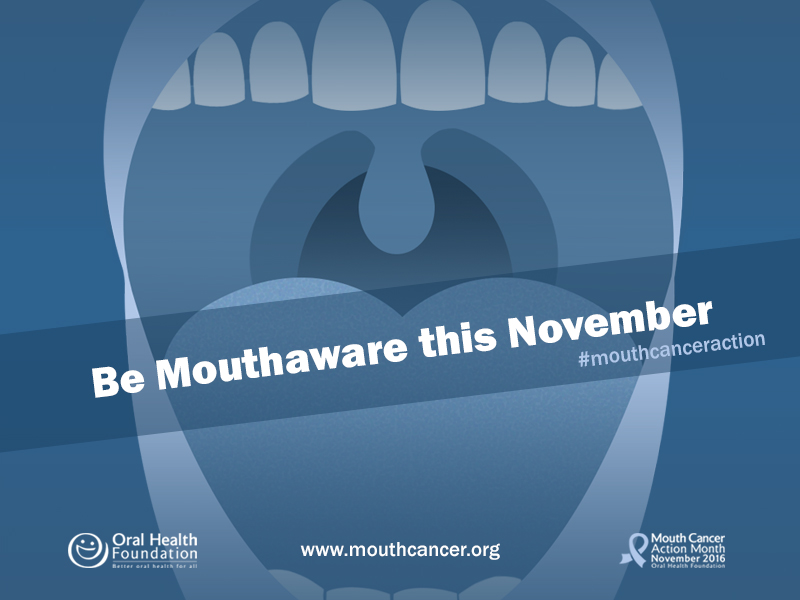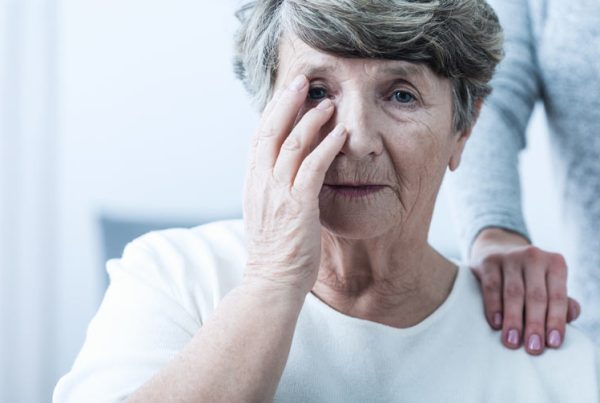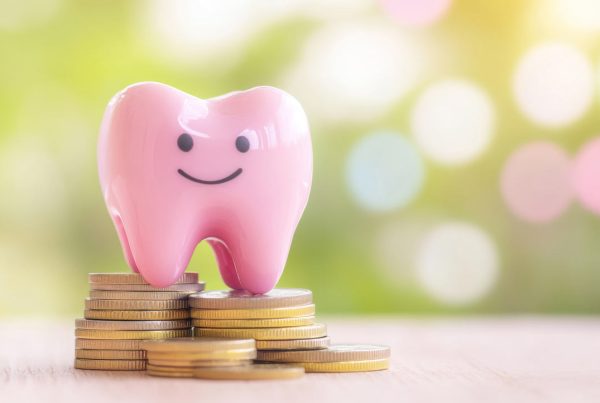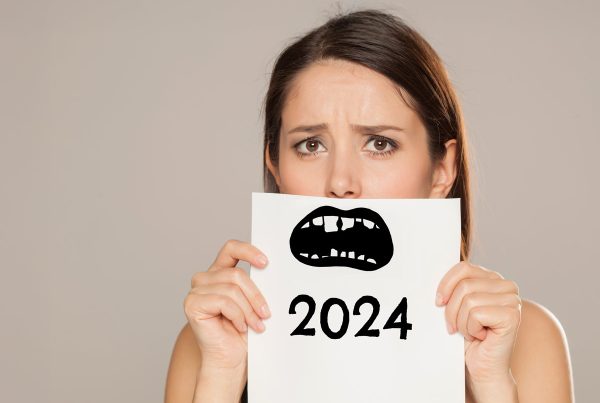November is Mouth Cancer Action Month, a charity campaign from the Oral Health Foundation. Its main aim is to raise awareness of risk factors and the signs and symptoms of mouth cancer in order to ensure that more early diagnoses can be made.
20 things to know…
- More than 7,500 people in the UK are diagnosed with Mouth Cancer every year. Early diagnosis can increase survival rates to 90%.
- Unfortunately, the number of people diagnosed with mouth cancer has increased by 40% in the last decade alone. Although many cases are linked to smoking, alcohol, sexual activity and a poor diet, it is important to remember that mouth cancer can affect everybody.
- Mouth cancer can impact how a person eats, drinks, speaks and even breathes. This can not only lead to nutritional deficiency, but the difficulties in communication, social isolation and the impact on relationships and career can also lead to depression.
- It is important that everyone diagnosed with mouth cancer understands that they don’t have to face it alone. There are many support networks available to help recovery and rehabilitation.
- Mouth cancer can strike in a number of places including the lips, tongue, gums and cheeks. It is essential that if you notice any changes in your mouth you make an appointment to see your dentist.
- 80% of people don’t know the symptoms of mouth cancer. We need to change this! Remember to see your dentist immediately if you notice any changes in your mouth, including lumps, swellings, white and red patches or ulcers that haven’t healed in three weeks. Share this with your friends to spread the word!
- Three signs and symptoms not to ignore are: ulcers which do not heal in three weeks, red and white patches in the mouth and unusual lumps or swellings in the mouth, head or neck area.
- As it stands, more people lose their lives to mouth cancer every year, than to testicular and cervical cancer combined. This is why it is so important to get that early diagnosis!
- 64% of people don’t know if their dentist checks for mouth cancer. We provide oral cancer screenings as part of every examination appointment. It is important that you regularly check your mouth for any changes. If any changes are spotted, please book an appointment to see the dentist immediately.
- Although mouth cancer can affect anybody, 9 in every 10 cases are linked to lifestyle and risk factors such as smoking, alcohol, diet, Human Papilloma Virus (HPV) chewing or ‘smokeless’ tobacco.
- Very few people are able to identify HPV as a leading cause of mouth cancer. Experts suggest that HPV could actually rival tobacco and alcohol as a leading risk factor within the next 10 years.
- All girls aged 12 to 13 are offered HPV (human papilloma virus) vaccination as part of the NHS childhood vaccination programme. Most people support making this vaccination gender neutral, in order to protect boys aged 12 & 13 against this virus too.
- Where mouth cancer is being diagnosed: Lips 5% in Men, 5% in Women, Gums 4% in Men, 8% in Women, Palate, 6% in men, 9% in women, Tonsil, 20% men, 14% women, base of tongue: 13% men, 7% women, other parts of tongue 18% men, 25% women, floor of mouth: 8% men, 8% women
- People who drink and use tobacco in excess are up to 30 times more likely to develop mouth cancer.
- Why not get involved in the #BlueLipSelfie campaign and help to spread the word about Mouth Cancer.
- According to the latest figures, 18 people every day are diagnosed with mouth cancer in the UK. That’s 1 person every 77 minutes.
- Second-hand or environmental tobacco smoke has been named a probable cause of mouth cancer. Mouth cancer risk is 87% higher in those who have never smoked and that have been exposed to tobacco smoke at home or work, compared with unexposed non-smokers.
- The survival rates for early diagnosis of mouth cancer are as high as 90%, however late diagnosis survival rates fall to 50% which is why it is so important not to wait.
- Mouth cancer is ranked the 16th most common cancer in the UK and it is one of few cancers that experts predict will continue to increase in the coming years.
- Around 7 people lose their fight to mouth cancer every single day in the UK. This is why Mouth Cancer Action Month is so important. Help us to reduce this figure by attending regular appointments and encouraging friends and family to do the same.
…and 5 ways you can get involved:
- Slap on some blue lipstick and pucker up! Take a selfie alone or with family, friends or colleagues, and upload it to the official blue lip selfie gallery. On the microsite, you can customise your selfies with fun blue cartoon lips. Alternatively, share on Twitter or Instagram using the hashtag #BlueLipSelfie – the choice is yours!
- Donate £1 and wear a blue ribbon. But don’t just buy one for you… get your family, friends and colleagues to pitch in too! We want to see as many of you as possible wearing them as a sign of support. You can purchase them from the online shop.
- Organise an event and raise some money! You can fundraise at work with your colleagues, in a group with friends, in your local community group or by doing an individual challenge. Find some great ideas here.
- Stop smoking! Research has shown that ex-smokers reduce their risk of mouth cancer by more than a third. And with around two thirds of smokers admitting they would like to kick the habit, Mouth Cancer Action Month is the perfect time to do just that. You’ll be protecting yourself and those around you, as secondhand smoke is another risk factor.
- Change your eating habits. Non-starchy vegetables and fruits (not salted or pickled), and foods containing carotenoids, can actually help to reduce mouth cancer risk. Lower risk is associated with the highest intake of the following foods:
Fruit – 48% lower risk.
Vegetables – 34% lower risk.
Vitamin C supplements – 24% lower risk (versus never-users).
Calcium supplements – 36% lower risk (versus never-users).
Caffeinated coffee – 39% lower risk in 4 cups/day (versus non-drinkers).
Green tea – 20% lower risk.
Find out loads more on the official campaign website and call us on 01482 565 488 today to make an appointment to get checked out. Better safe than sorry!



